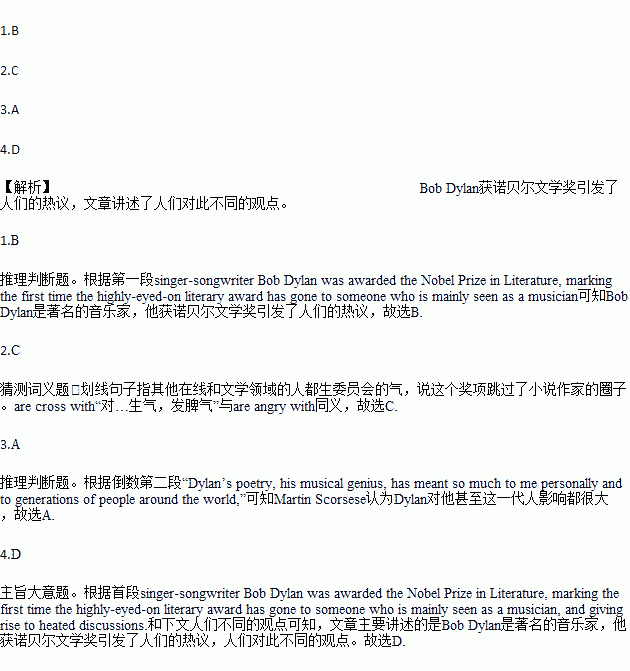题目内容
The times are changing. On Thursday October 13th, singer-songwriter Bob Dylan was awarded the Nobel Prize in Literature, marking the first time the highly-eyed-on literary award has gone to someone who is mainly seen as a musician, and giving rise to heated discussions.
The 75-year-old won the prize “for having created new poetic expressions within the great American song tradition”, the Swedish Academy said.
“For 54 years he has been at it, reinventing himself,” said Sara Danius, the academy’s permanent secretary. “Bob Dylan writes poetry for the car. But it’s perfectly fine to read his works as poetry.”
And while many Dylan’s fans have found great delight at the news, others online and in the literary community are cross with the Committee, saying the award has skipped over fiction writers for the second year.
New York Times Book Review editor Pamela Paul said it was good news but pointed out how many “deserving” novelists there are.
Director Martin Scorsese put out a statement saying he was “overjoyed” that Dylan was awarded the prize.
“Dylan’s poetry, his musical genius, has meant so much to me personally and to generations of people around the world,” Scorsese said. “His work has influenced and shaped culture, and he has never stopped exploring and growing as an artist. The Nobel Committee has given Dylan a form of recognition that fits his role in our culture—in world culture.”
Dylan won a Pulitzer Prize in 2008 for his “great influence on popular music and American culture”. He’s the first American to win the literary Nobel since Toni Morrison in 1993.
1.Why does Bob Dylan’s winning the Nobel Prize cause healed discussions?
A. He created poetic expressions. B. He is known as a musician.
C. He reinvents himself. D. He is 75 years old.
2.Which is closest in meaning to the underlined part in Paragraph 4?
A. are thankful to B. are satisfied with
C. are angry with D. are worried about
3.What can we know about Dylan according to Martin Scorsese?
A. Dylan influences Martin a lot.
B. Dylan is happy with the award.
C. Dylan is a poet rather than a musician.
D. Dylan benefits a lot from world culture.
4.What is the passage mainly about?
A. A brief introduction to Bob Dylan.
B. The reason for Bob Dylan’s success.
C. Bob Dylan’s influence on American culture.
D. Different views on Bob Dylan’s winning the Nobel Prize.
 轻巧夺冠周测月考直通中考系列答案
轻巧夺冠周测月考直通中考系列答案
